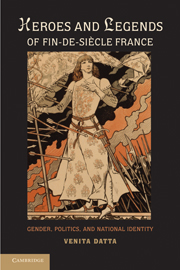Book contents
- Frontmatter
- Contents
- Acknowledgments
- Introduction: The Fin-de-Siècle Cult of Heroes
- 1 Gender, Class, and Heroism in the Bazar de la Charité Fire of 1897
- 2 Cyrano: A Hero for the Fin de Siècle?
- 3 “L'Appel au Soldat”: Visions of the Napoleonic Legend in Popular Culture
- 4 On the Boulevards: Representations of Joan of Arc in the Popular Theater
- 5 Opium, Gambling, and the Demimondaine: The Ullmo Spy Case of 1907–1908
- Conclusion: From One War to the Next: The End of Heroes?
- Selected Bibliography
- Index
3 - “L'Appel au Soldat”: Visions of the Napoleonic Legend in Popular Culture
Published online by Cambridge University Press: 05 June 2012
- Frontmatter
- Contents
- Acknowledgments
- Introduction: The Fin-de-Siècle Cult of Heroes
- 1 Gender, Class, and Heroism in the Bazar de la Charité Fire of 1897
- 2 Cyrano: A Hero for the Fin de Siècle?
- 3 “L'Appel au Soldat”: Visions of the Napoleonic Legend in Popular Culture
- 4 On the Boulevards: Representations of Joan of Arc in the Popular Theater
- 5 Opium, Gambling, and the Demimondaine: The Ullmo Spy Case of 1907–1908
- Conclusion: From One War to the Next: The End of Heroes?
- Selected Bibliography
- Index
Summary
Although the real Cyrano was an obscure historical personage transformed into one of France's leading heroes at the fin de siècle, the figure of Napoleon, like Joan of Arc, already occupied a large place in the French collective national consciousness as a lieu de mémoire. Nevertheless, as in the case of Joan, the Napoleonic legend witnessed a revival during the late nineteenth and early twentieth centuries. Military heroes, as the popularity of Cyrano, Napoleon, and Joan illustrate, had special resonance at this time and were, moreover, a part of a republican effort to recuperate the past. In this chapter, the theme of the military hero is explored once again, through an examination of the way in which writers and critics exploited the Napoleonic legend for different political and cultural ends. Whereas numerous works on the military aspects of the Napoleonic legacy exist, representations of the Napoleonic legend in the popular culture of the fin de siècle constitute a relatively little-studied phenomenon.
Although it focuses mainly on the theater, this chapter also includes a discussion of two key novels on the Napoleonic legend, without which an understanding of the Napoleonic legacy at this time would not be complete. Concentrating on Victorien Sardou's (with Emile Moreau) Madame Sans-Gêne (1893), Maurice Barrès's Les Déracinés (1897), Edmond Rostand's L'Aiglon (1900), and Gyp's Napoléonette (1913), it argues that following the defeat of Boulangism, the Napoleonic legend was divorced from party politics and experienced a revival in popular culture.
- Type
- Chapter
- Information
- Heroes and Legends of Fin-de-Siècle FranceGender, Politics, and National Identity, pp. 108 - 141Publisher: Cambridge University PressPrint publication year: 2011



